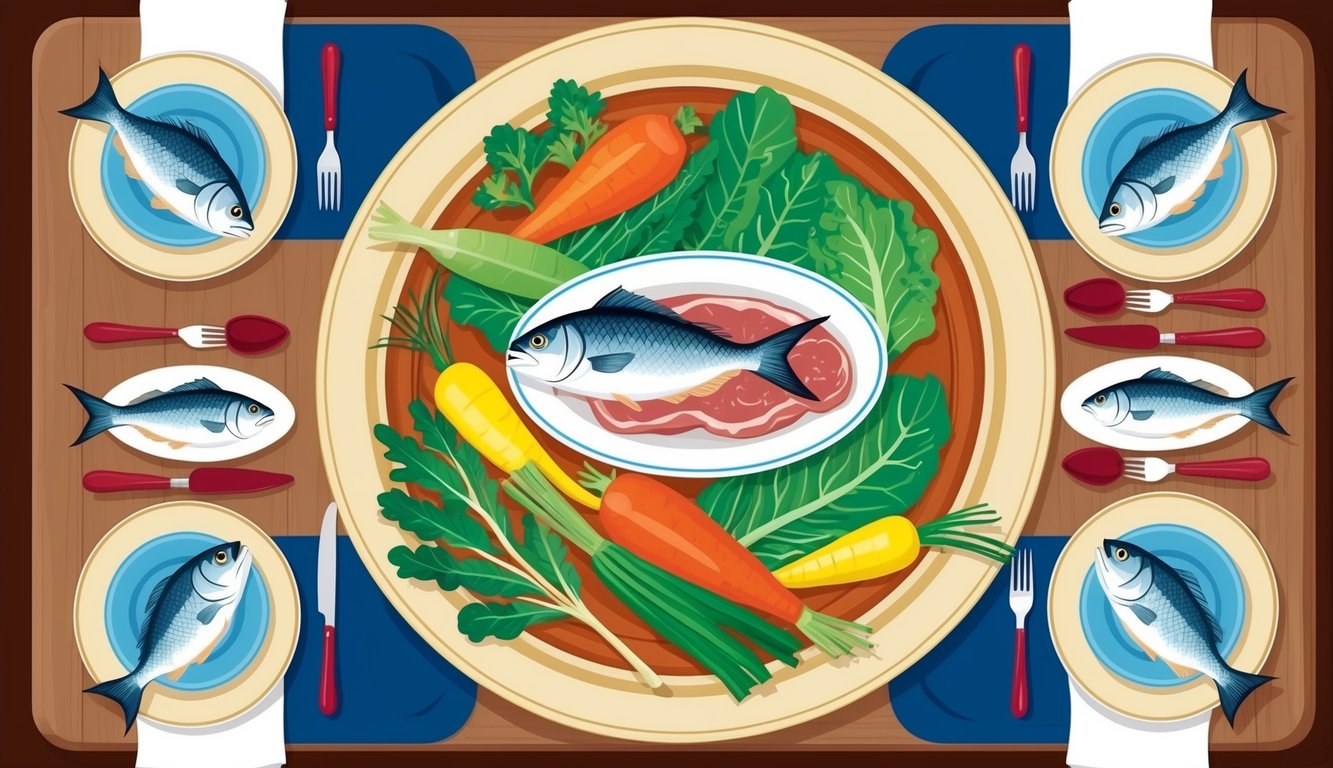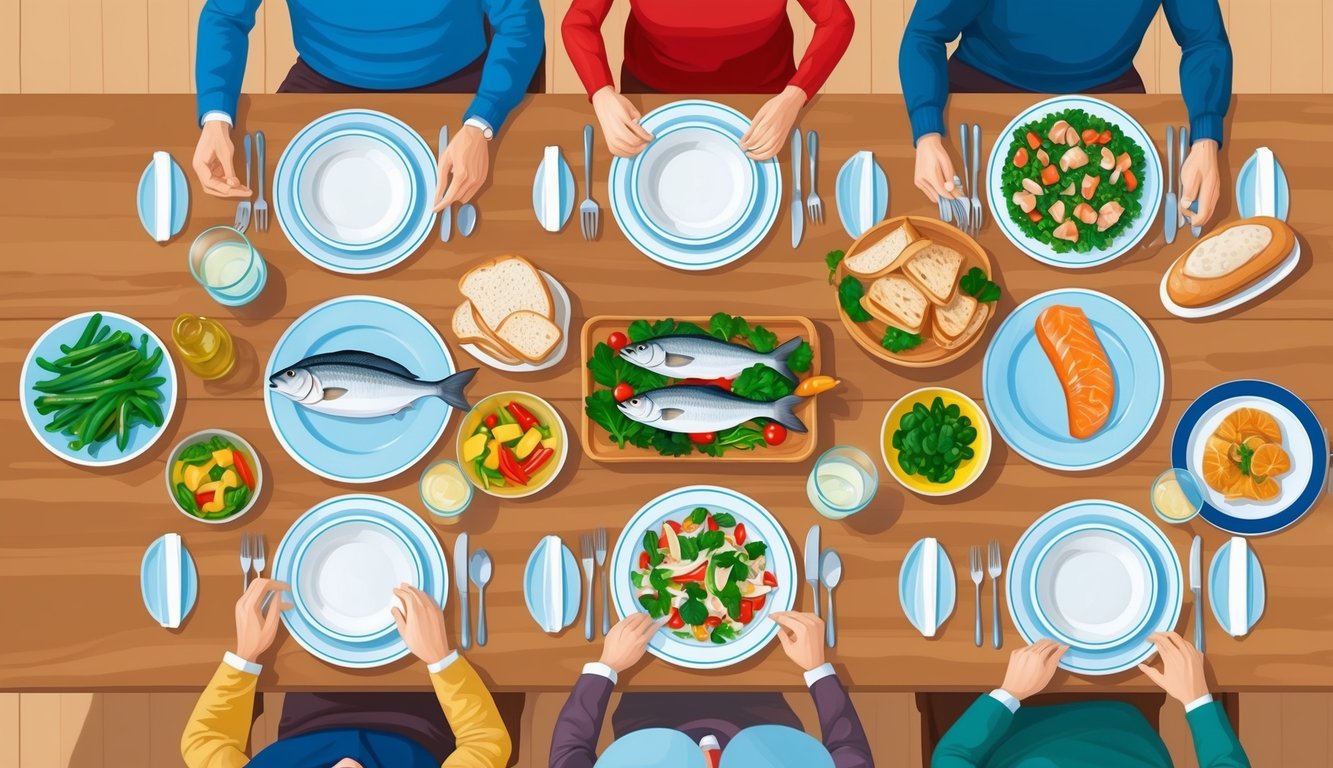Don’t Miss Out On This Unique Astrological Opportunity
Are you tired of spinning your wheels and getting nowhere? Simply put, you’re out of sync: you’re out of alignment with your astral configuration.
But: there’s a kind of map that can help you reclaim your alignment. Think of it as your own personal blueprint to success and happiness: a blueprint that will help you live your most amazing life.
Get started here.
Have you ever wondered about the age-old question, “Can you eat meat on Good Friday?” This question is rooted in religious tradition and holds significance for many Christians.
Christians around the world often consider Good Friday a day of fasting and abstinence to honor the day of Jesus Christ’s crucifixion. Traditionally, Christians are encouraged to avoid eating meat on Good Friday. Fish, however, is usually allowed, making it a popular alternative.
Understanding this practice can add depth to the way you observe this solemn day.
For centuries, the custom of abstaining from meat has been a part of Good Friday rituals.
This tradition has its roots in expressions of penance and reflection, which are integral during this time.
By choosing not to eat meat, you participate in a practice that links you to a longstanding and meaningful tradition.
Why is fish often seen as an exception? Some say it’s a symbol of the Christian faith itself.
Also, fish was considered a more humble meal historically, aligning with the spirit of penance.
If you’re curious about these customs, exploring them can enrich your faith and cultural appreciation.
It’s fascinating to see how this tradition has been kept alive across generations.
Significance of Good Friday
Good Friday is an important day in Christianity, observed during Holy Week.
It commemorates the crucifixion and death of Jesus Christ, emphasizing themes of sacrifice and redemption.
Traditions like fasting and penance play a vital role in how Christians honor this day.
The Passion and Crucifixion of Jesus Christ
On Good Friday, Christians remember the Passion and Crucifixion of Jesus Christ, a pivotal event celebrated during Holy Week.
This day is marked by Jesus’ journey to the cross, where he was crucified as a sacrifice for humanity’s sins.
His death is seen as a profound act of love and redemption, opening the door to salvation and eternal life for believers.
The story of Jesus’ suffering, from his arrest to his trial, and finally the crucifixion, inspires deep reflection.
It is a somber reminder of the sacrifices made and the ultimate victory over death, which is later celebrated on Easter Sunday with the resurrection.
For many Christians, Good Friday is a time for contemplation and gratitude for Jesus’ selfless act.
Fasting and Penance in the Christian Tradition
Fasting and penance are meaningful traditions associated with Good Friday.
Many Christians participate in fasting, echoing Jesus’ sacrifice and suffering.
The Catholic Church particularly emphasizes abstaining from meat on this day and also on Ash Wednesday, marking it as a time for spiritual discipline.
These practices encourage self-reflection and a deeper connection to the events of Good Friday.
Engaging in penance allows believers to express sorrow for sins and renew their faith.
It’s a time for quiet reflection, prayer, and acts of charity.
While fasting, you are reminded of Jesus’ hardships, and it serves as a way to participate in his journey.
Dietary Observances during Lent
During Lent, many Christians observe special dietary rules.
Some traditions focus on abstaining from certain foods, while others restrict how much you eat.
Understanding these practices can help you follow the spiritual significance of Lent.
Abstinence from Meat on Good Friday
Good Friday holds a special place in Christian traditions.
On this day, you’re often required to abstain from meat as a form of sacrifice and reflection.
Meat like beef, pork, and chicken is avoided, emphasizing fish or plant-based meals instead.
Some also give up eggs and dairy products, but practices can vary.
The church encourages this practice to honor the sacrifice of Jesus and reflect on your own spiritual journey.
Good Friday is a day of prayer and fasting for many, marking a significant event in the Lent calendar.
Fridays of Lent and Other Observances
Fridays during Lent are marked by abstaining from meat.
This tradition serves as a reminder of sacrifice and discipline.
Like Good Friday, other Fridays focus on meals without meat, drawing attention to fish or vegetarian dishes.
You’re encouraged to have smaller meals throughout these days.
Typically, this might mean one full meal and two smaller meals that do not equal another full meal.
It’s not just about giving up something; it’s about taking the time to grow spiritually and connect with your faith.
These practices encourage reflection and bring focus to the meaning of Lent, helping you prepare for the celebration of Easter.
Catholic Teachings and Laws on Abstinence

In Catholicism, abstinence from meat is a long-standing tradition, especially on specific days like Good Friday.
This practice is guided by the Code of Canon Law and varies slightly depending on age and health conditions.
Code of Canon Law and Good Friday
The Catholic Church sets specific rules regarding abstinence through the Code of Canon Law.
Canon 1253 allows individual dioceses to make their own rules about fasting and abstinence.
Good Friday is one of the obligatory days, meaning Catholics are required to abstain from eating meat.
These guidelines ensure that Catholics around the world observe the same traditions, although variations can exist based on cultural or local norms.
Age and Health Considerations for Fasting
While the general rule is abstaining from meat, certain groups have exemptions.
The United States Conference of Catholic Bishops (USCCB) identifies age and health as factors in determining one’s obligation.
Typically, those under 14 and over 60, alongside nursing women and those with specific health needs, are excused from fasting.
These considerations ensure that the physical needs of individuals are respected while maintaining the spiritual practice of abstinence.
Cultural Practices and Variations

On Good Friday, Christians around the world have different customs when it comes to dietary practices.
These traditions often include avoiding meat and opting for alternative foods.
Good Friday Customs Around the World
In the UK, especially in England and Wales, many people refrain from consuming meat on Good Friday.
This tradition aligns with Christian beliefs of fasting and penance.
Instead, fish dishes are widely popular.
The fish symbol has historical ties to Christianity, representing Jesus and early Christian communities.
Recipes often feature seafood as a central ingredient, incorporating local herbs and spices.
These customs can vary within different regions, with some communities adopting a more vegetarian approach, emphasizing fruits and vegetables.
Alternatives to Meat in Christian Observance
On Good Friday, Christians who abstain from meat explore a variety of delicious alternatives.
Common choices include fish, vegetables, and plant-based proteins.
Fish is a traditional option, rich in symbolism and a favorite for many.
Vegetarianism is another route, with dishes like hearty vegetable soups or grain-based meals providing nutrition and flavor.
Religious recipes are often shared within families, keeping traditions alive.
Some households might create special meals using ingredients like lentils or chickpeas, which not only substitute for meat but also carry symbolic meanings in religious contexts.
These alternatives respect the spirit of fasting and reflection central to the observance of Good Friday.
Reflection and Community

Reflection and community on Good Friday involve rich traditions where both personal and communal aspects are important.
This day is marked by prayer, church services, and unity among Christians, particularly Catholics.
Prayer and Church Services on Good Friday
On Good Friday, many Christians gather for solemn services.
These gatherings often have a strong focus on prayer and reflection on the meaning of the Lord Jesus’ sacrifice.
The Easter Vigil and Paschal Fast are key components of these services.
These practices offer a time to pause and reflect deeply on the events leading up to Easter.
Many services include the reading of Biblical passages that recount the story of Jesus’ crucifixion.
For Catholics, attending church on this holy day is a vital part of their faith practice.
You might find services held in the church sanctuary with special attention to the rituals and prayers dedicated to this day.
Good Friday as a Day of Unity for Believers
Good Friday brings Christians together across the world, fostering a sense of unity and shared purpose.
Churches often encourage communities to gather and participate in special activities that emphasize the day’s significance.
These activities can range from group prayers to joint community services, uniting believers in their shared faith.
Pastoral statements often emphasize the communal aspect of Good Friday.
They encourage the faith community to come together in reflection.
This day serves as a reminder of the significant history of Christianity and the ways it continues to unify believers.
These statements highlight the importance of contemplation and devotion, urging individuals to recognize the sacrifices that shape their faith.
By acknowledging Christianity’s impact on history, believers gain a deeper appreciation for the traditions and values that have been passed down through generations.
This collective observance strengthens the spiritual connection among followers and reinforces their shared commitment to faith.
Whether attending a service or participating in communal prayers, Good Friday provides an opportunity to unite and reflect on the teachings of the faith.



